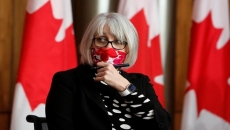TORONTO - Canadian courts grappling with the aftermath of pandemic closures and restrictions will have to parse out how much of the delays during COVID-19 should be deemed reasonable and unavoidable as more cases approach or exceed the maximum time frame set for criminal trials, experts say.
The pandemic halted in-person court proceedings for months in many provinces over the last two years and put jury trials on hold for long periods of time, exacerbating existing backlogs. Measures such as virtual hearings were implemented to minimize the impact of the pandemic, though not all cases could proceed remotely.
Rules setting a mandatory cap on the length of trials make exceptions for delays caused by unforeseen and unavoidable events. But as the pandemic stretches on, what meets that definition becomes less clear-cut, said Daniel Brown, a Toronto-based defence lawyer and vice-president of the Ontario Criminal Lawyers’ Association.
In matters that predated the global health crisis, or that emerged during court closures, it's usually clear which setbacks can be attributed to COVID-19, he said.
"But what about the cases that came into the system afterwards but are still impacted by the fact that these … cases are eating up a lot of trial dates?" he said.
Filling in for a colleague, Brown recently obtained a stay of proceedings on grounds of unreasonable delay in a sexual assault case that began during the brief window in which Ontario courts were fully operational in the fall of 2020, he said.
When the case was ready for trial, the only available date was a year away, pushing it beyond the maximum time limit, he said.
Before the pandemic, prosecutors would simply have asked the trial co-ordinator for an earlier date, Brown said. But that isn’t possible now because those dates are earmarked for older cases held up by COVID-19 disruptions, he said.
Currently, the only available remedy when a case is deemed to have taken too long is a stay of proceedings.
Cases that emerged during the pandemic are only now starting to approach the maximum threshold – 18 months for provincial court and 30 months for Superior Court – Brown said. Some are pre-emptively seeking a stay of proceedings through what’s known as an 11b application when given trial dates beyond that time frame, he said.
"Over the next six to 12 months, it'll be telling to see if there's more cases than before getting stayed for delay," Brown said.
When the Supreme Court of Canada established mandatory time limits as part of its ruling in the R. v Jordan case, its goal was to create a "more streamlined test" for assessing trial delay, said Palma Paciocco, a professor at York University’s Osgoode Hall law school.
But that system wasn't designed with something like COVID-19 in mind, she said.
Under the Jordan framework, delays caused by the defence are deducted from the total time of the case. After that, if the tally surpasses the established ceiling, it's presumed to be an unreasonable delay, she said. The onus is then on the Crown to show the setbacks were caused by exceptional circumstances that couldn't be mitigated, she said.
However, that analysis focuses on what can reasonably be done to offset delays in a specific case, rather than across the judicial system, she said. It would be difficult for judges to critically assess the appropriateness of systemic responses to COVID-19 in considering delays in individual cases, she noted.
Meanwhile, delays caused by systemic issues such as strained court resources were already taken into account in setting the time limits, she noted.
"That ceiling was assuming normal operations and not rolling court closures," said Paciocco, who has published on the issue.
"But at the same time, if we allow Crown attorneys to simply say, 'Well, look, COVID was unforeseen, unavoidable, there's only so much we can do to take steps to mitigate, and therefore this should just not be counted,' then the result is that we have presumptively innocent people … who are still experiencing all of the harms of trial delay in terms of their security and liberty and their ability to mount a full defence, but they don't get a remedy for that.
"And so I think we're really in a bind as a result," she said.
There will likely be lots of cases where trial delay coincided with the pandemic and an application under Jordan could be possible, she said. Courts will have to sort out what’s considered a reasonable delay in this context, and what could have been remedied by individual efforts, she said.
For example, in some cases, people may need to reschedule court dates due to school and daycare closures, she said. There could be disputes over whether that delay should be deducted from the tally or counted as part of the total time, she said.
"That has real fairness considerations and equity considerations when we think about how the pandemic differentially impacts different people," she said.
Dale Fedorchuk, a Calgary defence lawyer, said he's had trials delayed as many as three times during the pandemic as courts imposed restrictions aligned with provincial measures.
Still, at this time, Fedorchuk said he would be reluctant to apply for a stay on grounds of unreasonable delay, since courts in Alberta have so far excused setbacks during the pandemic as due to exceptional circumstances.
"The question becomes now … whether the prejudice experienced by the clients outweighs the systemic delay, such that 11b applications will start succeeding," he said.
But Fedorchuk said he expects making that argument would be "an uphill battle."
"A client would have to show particular prejudice, in the sense of not being able to produce a witness, not being able to have access to documents that once existed … that would bring the administration of justice into disrepute before a court would say that the systemic delay is overcome by the prejudice to the client."






